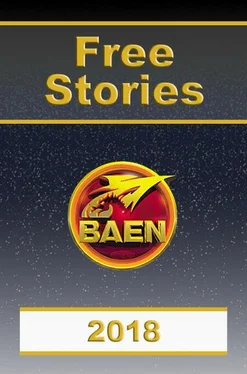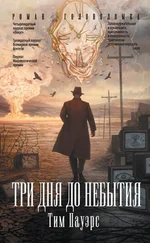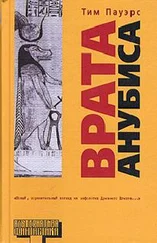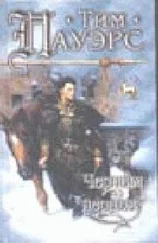“That is precisely what I am going out there to determine.”
Takeda grew thoughtful. “You know, Doctor, it may surprise you to learn that history has always been an interest of mine. And nothing I’ve ever read has given me any cause to doubt what I, like all of us, was taught in school: that the First American Rebellion never stood a chance, and that the peaceful settlement on the basis of imperial federation was the best possible outcome. In fact, the more history I read, the more I’m convinced of that second part. Empires evaporate if they get too big relative to their power base. That would eventually have happened to the British Empire if its power base had remained limited to just one little island. As it was, North America and, later, other colonial countries were incorporated into a power base that grew to keep pace with the Empire’s expansion.”
“Much as Rome incorporated other city-states on a basis of dual citizenship.”
“Exactly.” Takeda felt the pleasure a history enthusiast always feels at discovering a kindred spirit—rather like a Mason encountering another Mason. “Now, if that peaceful settlement hadn’t happened, the only alternative I can see is that the war would have dragged on, with more bloodshed leading to more bitterness. So after the inevitable British victory, a harsh, repressive rule would have been imposed, with mass treason trials, wholesale hangings, no more local self-government, and the American colonists left as sullen, unhelpful subjects—a calamity for everyone concerned.”
“I think I understand what you’re saying, Captain. If Yoder did succeed, he probably found a universe he liked even less than this one.” Willett paused. “But are you certain the British victory was inevitable? What if, somehow, the Rebellion had succeeded?”
Takeda made a dismissive gesture. “Oh, come, Doctor! I know you’re a New American, but you’re also a rational man. Everyone knows the rebels couldn’t possibly have won—that’s the consensus of all reputable historians. A large portion of their own population wasn’t behind them. The British had total command of the sea and the most highly professional army on the planet. And even if by some miracle the rebels had won their independence, their ‘United States of America’ would never have lasted. They undoubtedly would have fragmented into a patchwork of squabbling little agricultural states, pawns in the geopolitical games of the European powers.”
“Well, Captain,” said Willett with a smile, “it’s just barely possible that we may resolve some of these questions.”
* * *
Washington Station orbited well outside Tau Ceti’s “Secondary Limit,” beyond which the Bernheim Drive could warp space around a ship, enclosing it in a space-time bubble not limited to the velocity of light. But going superluminal within Tau Ceti’s debris disc was frowned upon—the density of space detritus was low, but any collision with a substantial object could damage or even wreck the drive. And, at any rate, it took some very careful piloting to not overshoot one’s objective across mere interplanetary distances.
Thus it was that Hawke accelerated outward in slower-than-light mode, with the drive folding space and thereby reducing normal gravity in front of the ship. Still, at four hundred gravities of pseudo-acceleration (fortunately unfelt by the ship’s occupants, who would have been in a state of free fall had it not been for the artificial gravity generators) the voyage was not a long one.
Willett explained that Jonas Yoder’s ideas for an alternate-reality linkage device were related to the drive. “We don’t know the details,” he admitted. “Yoder was very secretive, and he took all his notes with him when he departed. But it seems to have something to do with the fact that the drive changes the shape of space around the ship by wrapping negative energy around it. Negative energy, like negative mass, is allowable only in the microcosm—the domain of quantum mechanics. But of course you know all this.”
“Yes,” Takeda nodded. “Tapping into that subspace for usable negative energy was the greatest problem Bernheim had to overcome.”
“Well, Yoder was convinced that there was at least one other exotic energy state—he never publicly discussed its exact nature—that could be utilized for his purposes. Possibly it was this that the survey ship detected. The instruments that I’ve asked you to have connected to this ship’s sensor suite are designed on the basis of the readings that ship recorded—and now we know the exact region of space in which to search.”
As it turned out, however, Hawke ’s own sensors were the first to detect the phenomenon. Not long after they passed beyond the outermost limits of the debris disc, the gravitic scanners revealed an intense gravity field—evidently artificial gravity, since there was no large mass to account for it.
“The survey ship’s report mentioned nothing about this,” fidgeted Willett.
“They wouldn’t have had Navy grade long-range gravitic scanners,” Takeda reminded him. “They detected this ‘exotic energy flux’ by other means before they were close enough for their civilian gravscanners—if they had even those—to pick up this gravity field. Mr. Malone is doing a detailed analysis of the readings, and he should have some answers for us soon.”
After consultation with the ship’s sensor ratings and the technicians Willett had brought aboard, the first officer approached the captain’s chair, frowning. “Captain, we’ve now got readings on Dr. Willett’s equipment that match what was reported. But as for the G-field… we’re still not close enough to detect what’s generating it. But it’s a very intense one—an odd kind of gravitational vortex. And it’s… anomalous.”
“Explain, Number One.”
“As I said, sir, it’s very strong—but it somehow reverses itself.”
“What does that mean?” Willett wanted to know.
“It’s a matter of a ship’s vector. If you’re heading into it, it will suck you in toward the center. But if you were headed outward from the center, it would shove you out. Spit you out, really.”
Takeda felt he must be missing something. “How could that be? And how the devil would anybody be heading out of it?”
“Unknown, Captain. It’s a complete mystery to Dr. Willett’s people too.”
“You say you can’t detect a generator yet?” Asked Willett.
“No, Doctor. But I can tell you this much. Your people gave me the specifications for Jonas Yoder’s ship, and if it were that size we would be able to detect it. It’s simply not there.”
“Is there any sign of wreckage?”
“No, and even if there ever were any, I doubt if we’ll find it now. I imagine it would have long since been drawn in by the gravity field. But we won’t be able to do a real search for it until we get closer.”
“Which we are going to do with great caution,” Takeda stated firmly. “We won’t head straight down the gravity well, of course. We’ll go into a hyperbolic orbit of the… phenomenon, passing its center as closely as possible without getting within its Primary Limit.”
“Aye, aye, sir,” said Malone. The “Primary Limit” was defined by a gravitational force of 0.1 Earth G; any stronger and the Bernheim Drive would not function even in slower-than-light mode. “I’ll instruct the helmsman. Of course, it goes without saying that this will bring us well within the Secondary Limit.”
“Of course,” Takeda echoed. “No matter. We’ll have no reason to want to go superluminal.” He turned to Willett. “Well, Doctor, maybe we’ll have your answers soon.”
* * *
As they drew closer, the first officer’s skepticism was confirmed. No trace of wreckage was found. At the same time, it became possible to detect a material object at the center of the gravity field. It wasn’t a naked-eye object, and wouldn’t have been even if it hadn’t been surrounded by a region of slight visual distortion, with the stars behind it seeming to wave and flicker. But it was definitely there.
Читать дальше








![Тим Пауэрс - Последние дни. Том 2 [litres]](/books/393813/tim-pauers-poslednie-dni-tom-2-litres-thumb.webp)
![Тим Пауэрс - Последние дни. Том 1 [litres]](/books/394090/tim-pauers-poslednie-dni-tom-1-litres-thumb.webp)
![Тим Пауэрс - Последний выдох [litres]](/books/402145/tim-pauers-poslednij-vydoh-litres-thumb.webp)